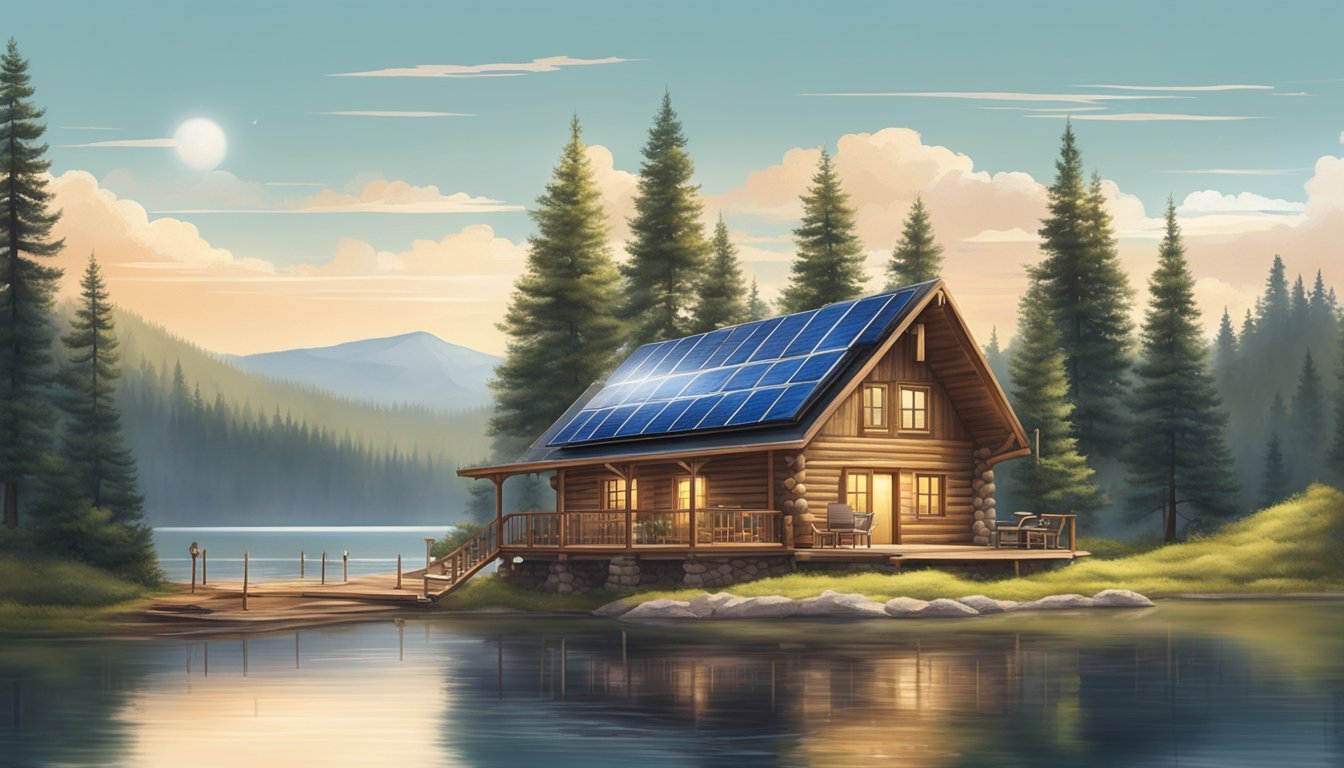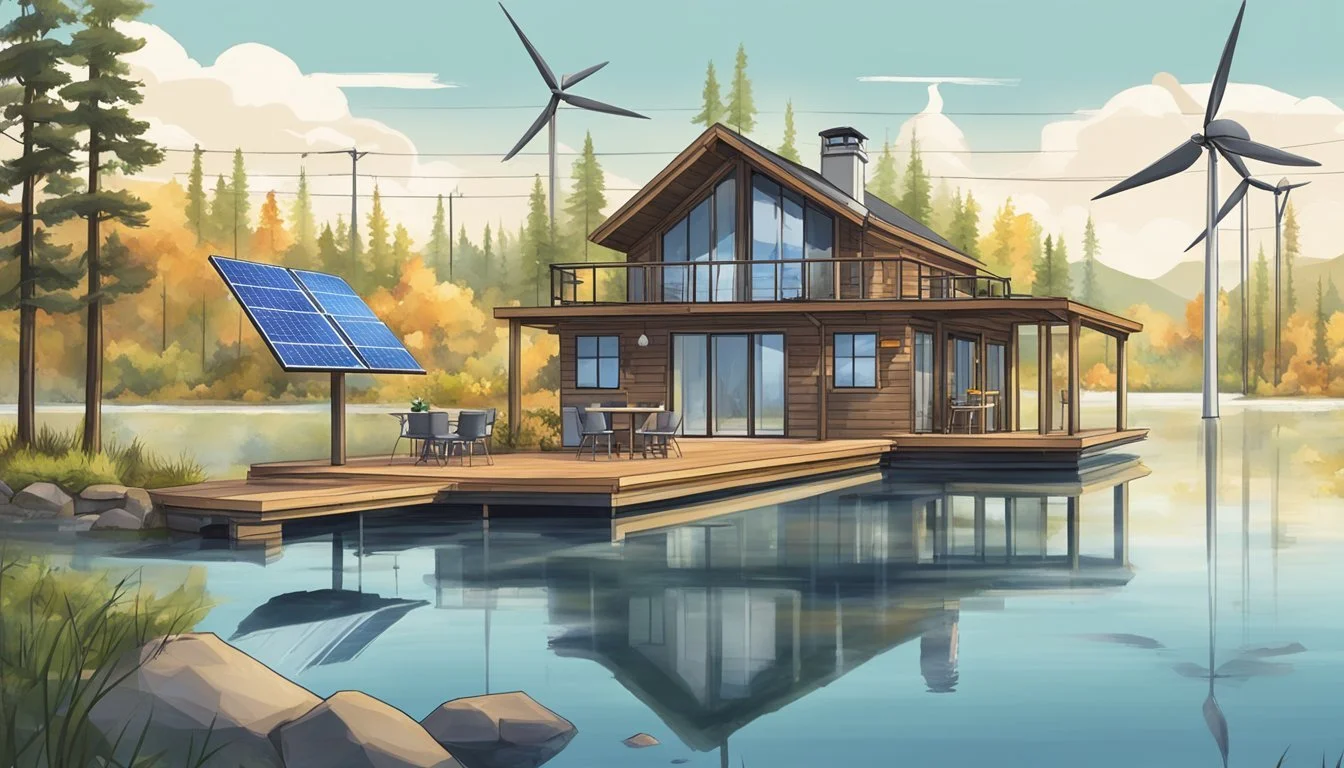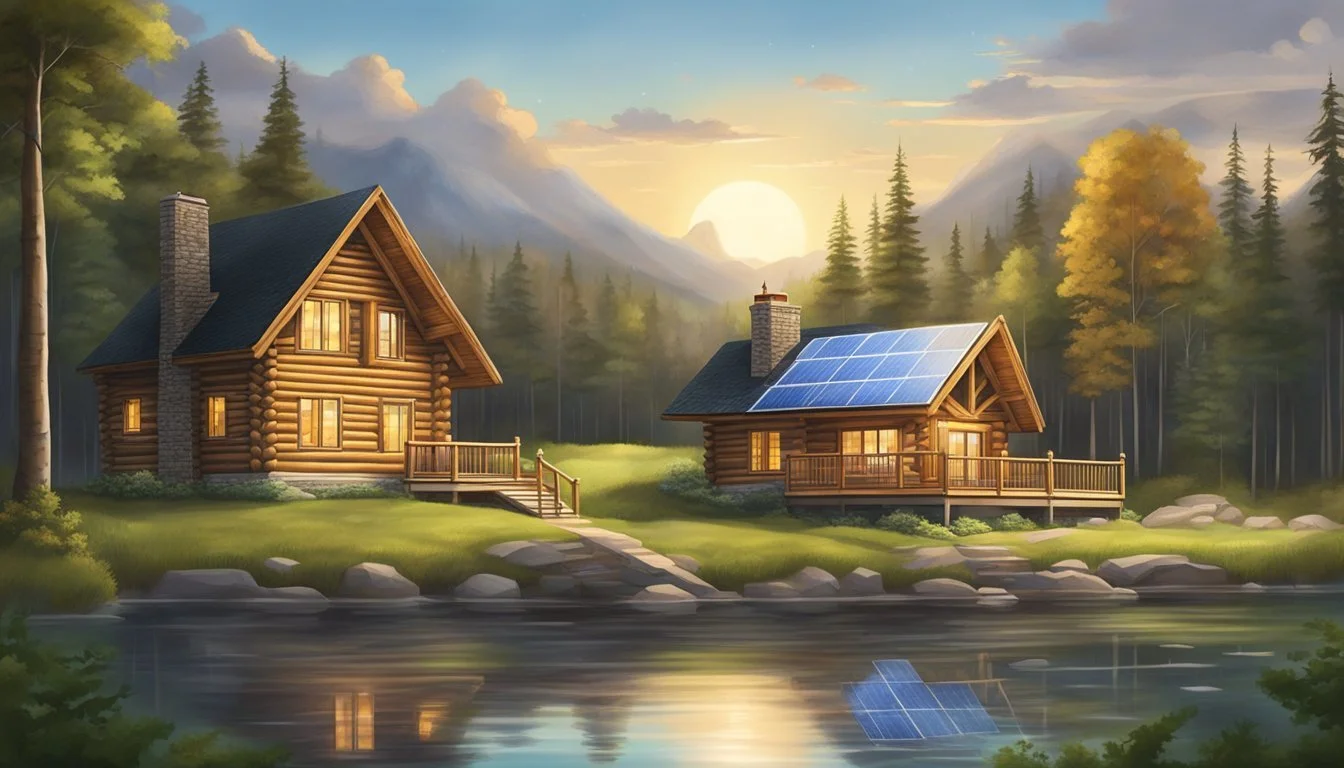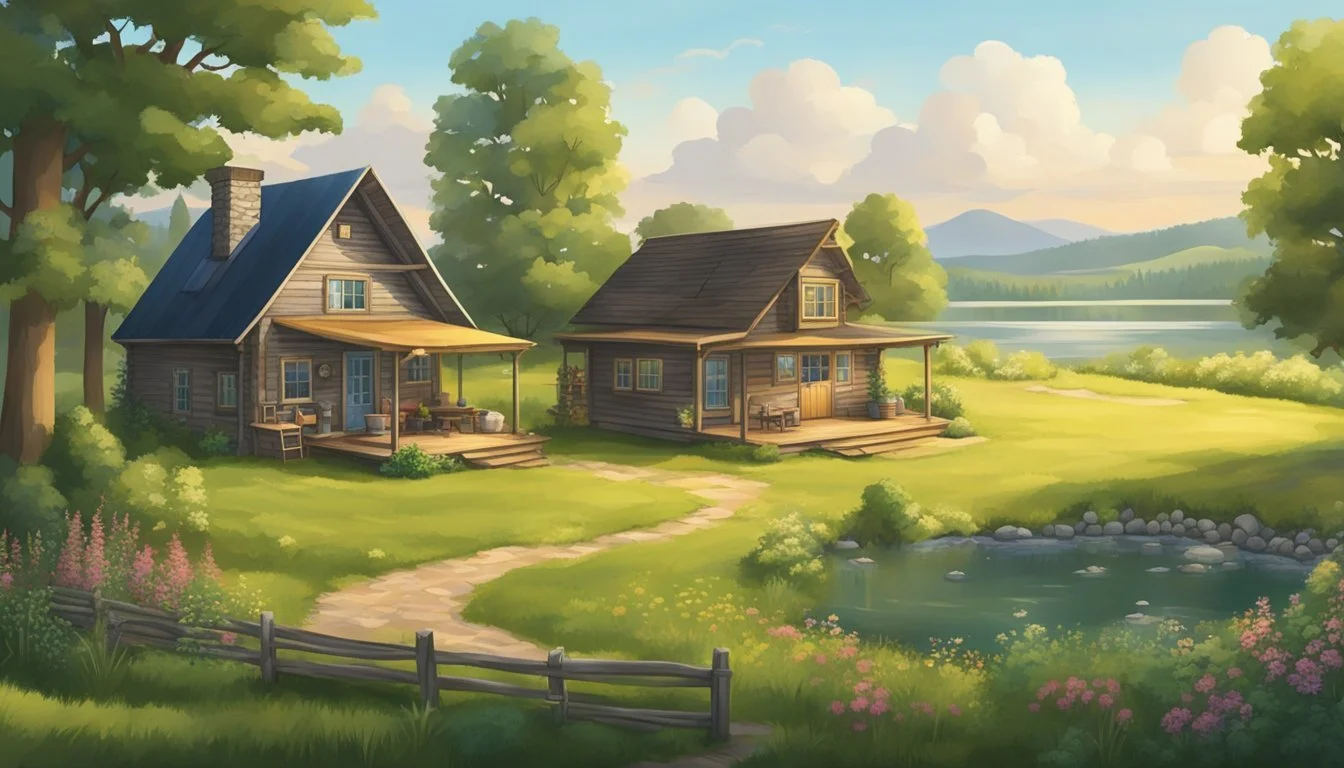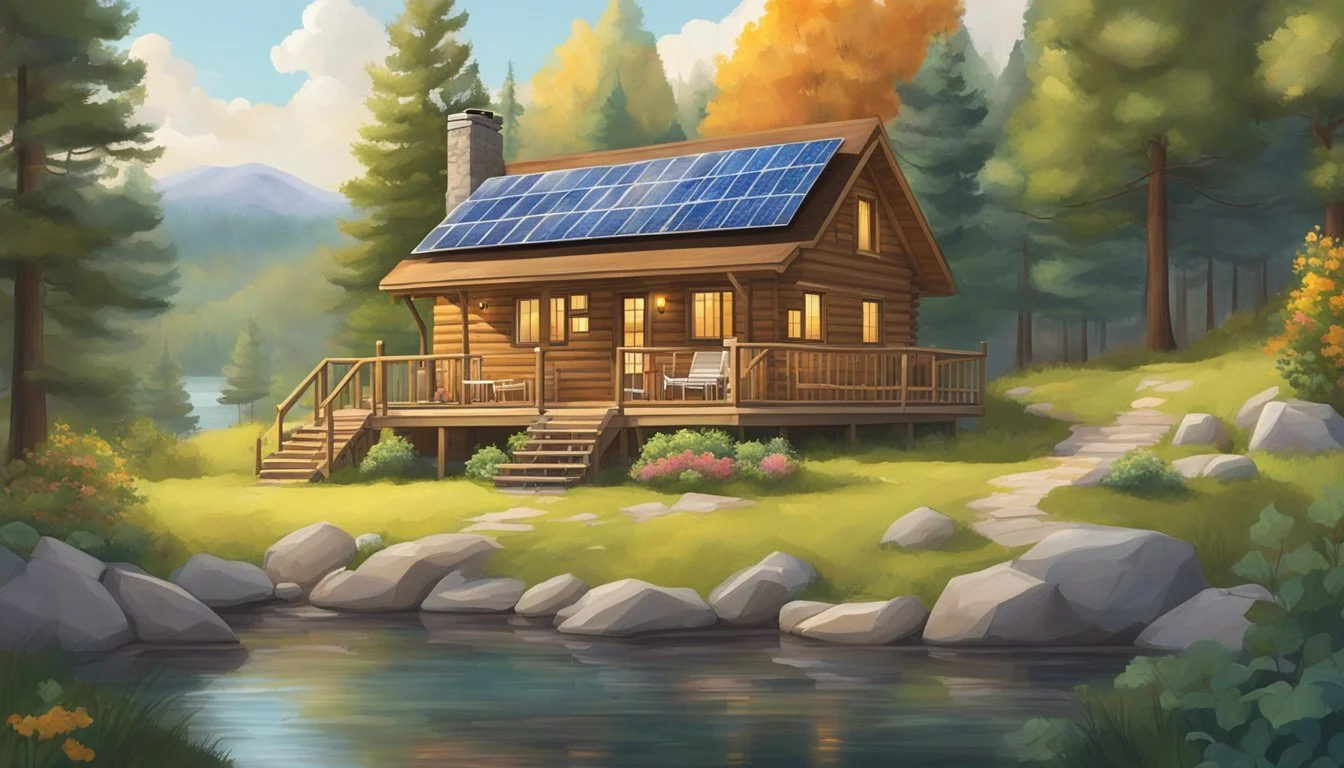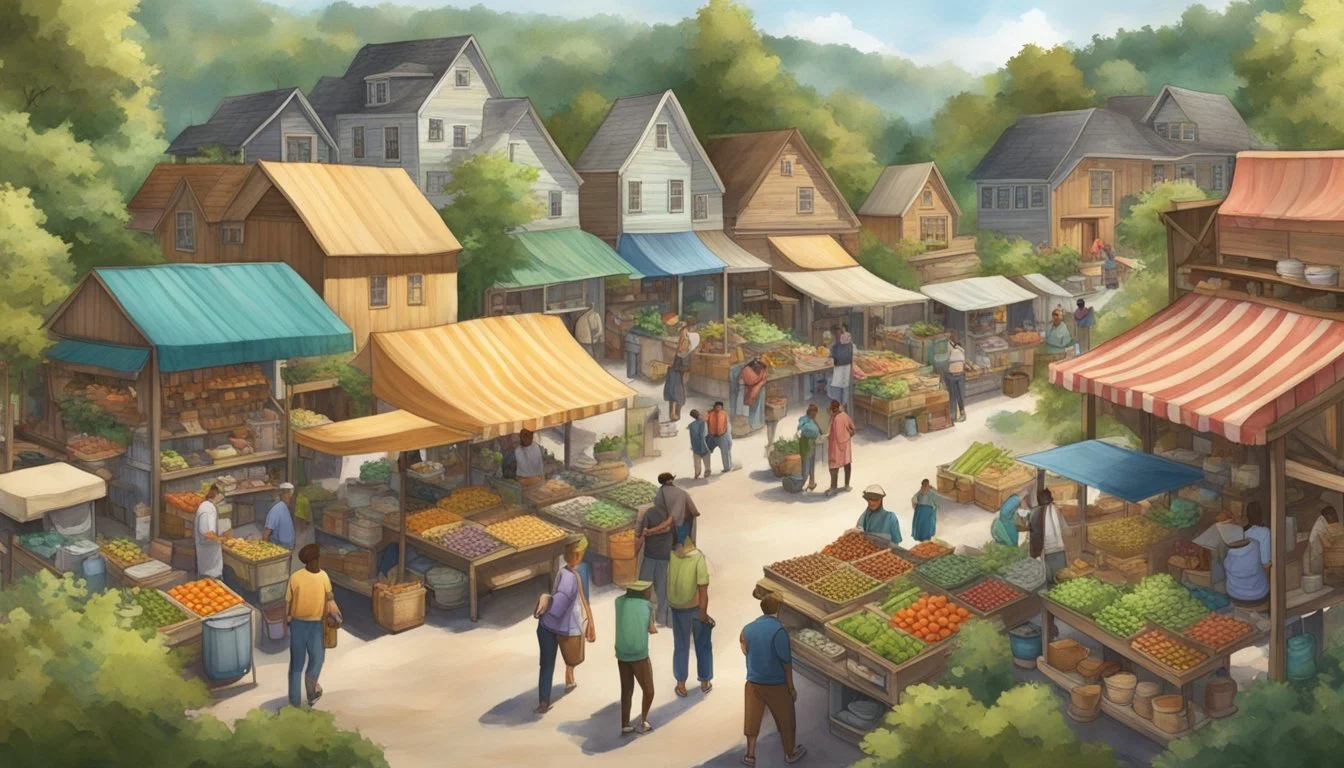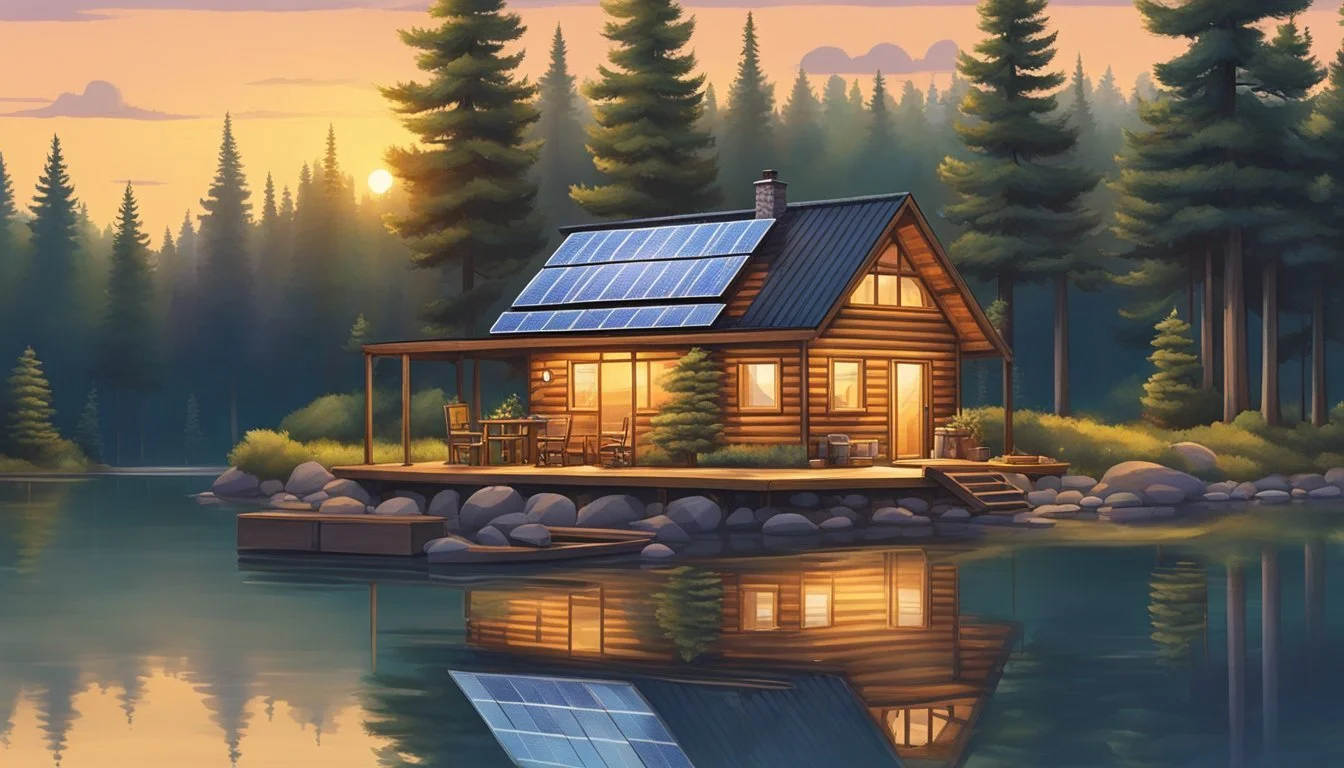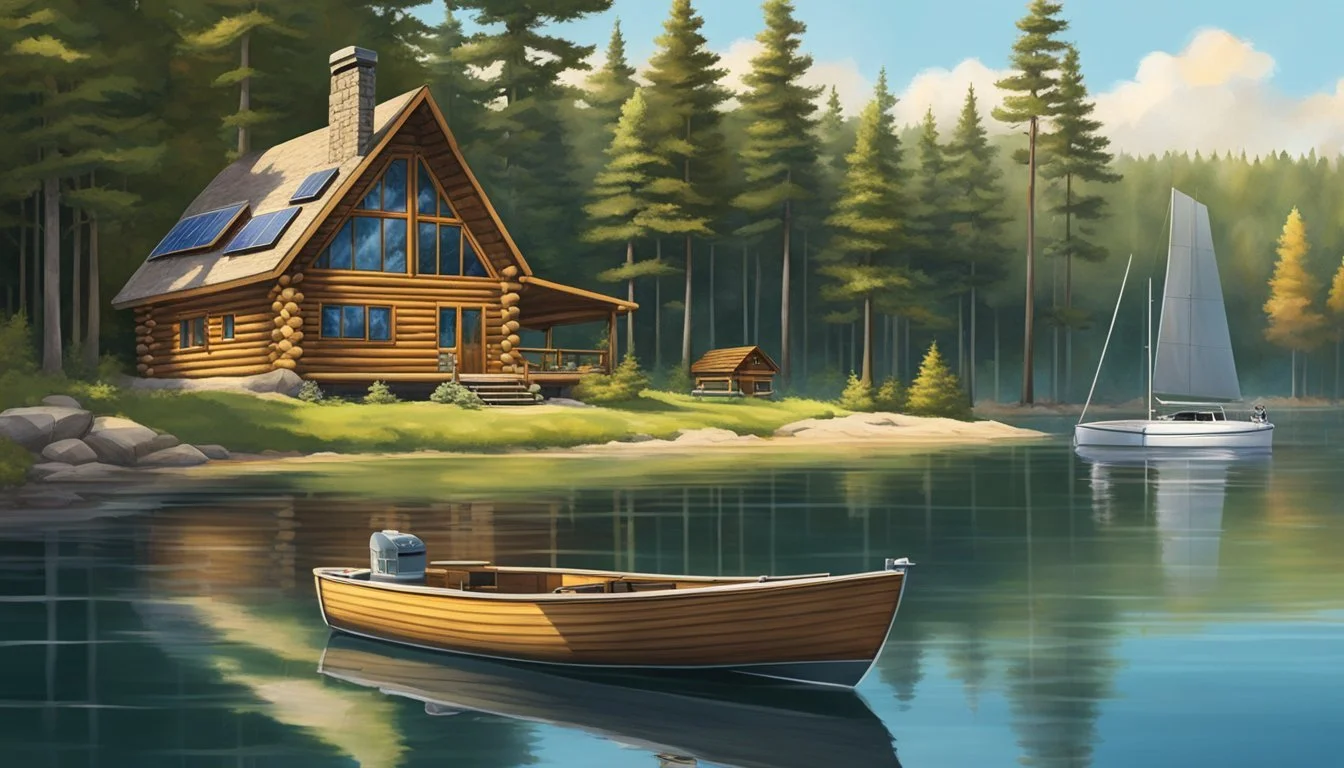Great Lakes Off Grid Living
Embrace Nature and Sustainability
Nestled in the heart of the Midwest, the Great Lakes region offers an exceptional opportunity for those seeking an off-grid lifestyle. With its vast natural resources, including abundant fresh water and expansive forests, Michigan stands out as a prime location for self-sufficient living. The affordable land and lower housing costs make it an attractive option for those looking to escape the grid.
The Great Lakes provide not only a scenic backdrop but also practical resources for off-grid living. In addition to fresh water for drinking and farming, the region's diverse landscape supports various outdoor activities like hiking, boating, and fishing. This makes it easy for residents to maintain an active, healthy lifestyle while remaining self-sufficient.
Michigan's off-grid communities are becoming increasingly popular, offering a blend of sustainability and resilience. Areas such as Keweenaw County and Marquette County are particularly well-suited for homesteading due to their natural beauty and resources. For those ready to embrace a sustainable and independent lifestyle, the Great Lakes region presents an unparalleled opportunity.
Understanding Off-Grid Living
Off-grid living relies on self-sufficiency and sustainability. This approach minimizes reliance on public utilities by leveraging natural resources effectively.
Definition and Principles
Off-grid living involves creating a home and lifestyle independent of municipal services like electricity, water, and sewage systems. It employs alternative methods for essential needs such as solar panels, rainwater harvesting, composting toilets, and wind turbines.
The primary principles of off-grid living include self-sufficiency, ensuring that all basic needs are met through carefully managed resources. Sustainable living is another cornerstone, emphasizing minimal environmental impact. Efficient use of natural resources such as sunlight, wind, and rainwater plays a crucial role in maintaining this lifestyle.
Benefits of Off-Grid Life
The benefits of off-grid living are significant and appealing to many. Financially, it can lead to lower housing costs since it often involves purchasing affordable land and utilizing renewable resources for energy and water. This lifestyle reduces dependency on fossil fuels, contributing to a lower carbon footprint.
Environmentally, it encourages the use of sustainable practices, lessening the impact on the planet. It also promotes self-reliance, as individuals or families manage their own utilities and supplies. The sense of community among off-gridders can be strong, fostering a supportive network of like-minded individuals.
Challenges and Considerations
Despite its many benefits, off-grid living comes with challenges. The initial investment in alternative energy systems like solar panels or wind turbines can be costly. Ensuring a reliable water supply through rain barrels or wells requires careful planning and regular maintenance.
Another significant consideration is the time and effort required to maintain off-grid systems. Managing waste, generating power, and sourcing food can be labor-intensive. For some, the isolation from urban conveniences might pose a drawback. The higher unemployment rate in regions like Michigan may also affect financial stability for those choosing this lifestyle.
In conclusion, while off-grid living offers many appealing advantages in terms of sustainability and self-reliance, it also demands careful planning and a willingness to embrace its unique challenges.
Geographical Context
The Great Lakes region offers a diverse range of environments beneficial for off-grid living, including abundant fresh water resources and a mix of climates. These key aspects make it an attractive choice for those seeking a self-sufficient lifestyle.
The Great Lakes Region
The Great Lakes region encompasses parts of the Midwestern United States, including Michigan, and extends into Canada. This region is defined by five major lakes: Lake Superior, Lake Michigan, Lake Huron, Lake Erie, and Lake Ontario.
Michigan's Upper Peninsula is particularly well-known for its secluded, forested landscapes. The lakes themselves provide access to vast amounts of fresh water, essential for both daily living and farming. The area's natural beauty is marked by a mix of dense forests and fertile soil, making it an appealing location for those looking to live off the grid.
Climate and Environment
The climate in the Great Lakes region can be diverse and quite variable. Michigan, for instance, experiences harsh winters with significant snowfall, especially near Lake Superior. Summers, on the other hand, are typically mild and pleasant.
The local climate is heavily influenced by proximity to the lakes, which can moderate temperatures but also bring about more humidity. This mix of climates supports a wide range of plant and animal life, providing a solid foundation for sustainable living. The forests in this area are rich in resources, including timber and wild game, further supporting an off-grid lifestyle.
Property Availability
Property availability in the Great Lakes region varies, with numerous options ranging from private, secluded parcels to larger working farms. In Michigan's Upper Peninsula, there are opportunities to buy land that is both affordable and remote, offering ample privacy.
Potential buyers can find fertile soil and access to freshwater sources, critical for farming and personal use. Additionally, some properties even include private islands, adding a unique and highly secluded aspect to off-grid living. It's important to consider the local regulations and zoning laws, which can impact the feasibility of setting up an off-grid home in some locations within this diverse region.
Legal and Regulatory Framework
Navigating the legal landscape of off-grid living around the Great Lakes involves understanding zoning and building codes, land use and property regulations, as well as water and environmental laws. Each of these areas has specific requirements and restrictions that must be followed to ensure compliance and avoid potential legal issues.
Zoning and Building Codes
Zoning laws determine how land can be used and what types of structures can be built. In the Great Lakes region, these laws can be strict, especially regarding the minimum floor area for homes. For instance, counties may have floor area requirements exceeding typical tiny home dimensions, such as 1,000 sq. feet in some areas.
Building codes are another critical aspect. These codes ensure that structures meet safety standards. Off-grid enthusiasts need to address structural integrity, electrical, and plumbing systems compliance. Proper permitting is also essential; permits are required for construction and renovations, ensuring all work adheres to local regulations.
Land Use and Property Regulations
Land use regulations in the Great Lakes region encompass property zoning, easements, and rights of way. These rules dictate how land can be developed or used, which is crucial for off-grid living. Property owners need to verify if the land is designated for residential use and if off-grid setups are allowed.
Property regulations may also require specific permits, such as soil and erosion permits, to prevent environmental degradation. Understanding property easements is important as they can affect how land can be accessed and utilized. Local laws often differ, so it's essential to research and comply with all relevant rules.
Water and Environmental Laws
Water rights and environmental laws are particularly important for off-grid living. Water rights vary significantly by state, and in some areas, it may be illegal to collect rainwater or drill wells without permits. These regulations ensure sustainable water use and protect the environment.
Environmental laws may include restrictions on septic systems, waste disposal, and preserving natural habitats. Off-grid homeowners must ensure their waste management systems meet local health standards. Environmental permits may be required to manage soil and avoid erosion, which can be critical to maintaining the natural landscape and water quality in the Great Lakes area.
Setting Up Your Homestead
Selecting an ideal location, developing necessary structures, and establishing utilities are crucial steps in setting up a successful off-grid homestead.
Selecting Your Location
Selecting the right location is key. Areas near natural water sources such as lakes, rivers, or ponds are beneficial. Access to reliable water simplifies water collection and purification, essential for daily living.
Soil quality is another consideration. Fertile soil is vital for growing crops and maintaining a productive garden. Assess the land for sunlight exposure to optimize solar panel installation and potential wind turbine placement. Avoid locations with restrictive building codes, which can hinder construction and development.
A location with some existing infrastructure, like an old barn, can also reduce initial setup time and costs.
Construction and Development
Construction begins with designing a resilient shelter. Durable and energy-efficient materials are preferred. Proper insulation and ventilation enhance comfort and sustainability. Building to code prevents future legal issues and ensures safety.
When developing the land, consider crop layout and access routes. Constructing water wells or creating rainwater collection systems is fundamental for off-grid water access. Establishing adequate septic systems is necessary for sanitation.
Building solar arrays and installing wind turbines for off-grid electricity generation will reduce fossil fuel dependency. A backup generator can ensure energy resilience during periods of low solar or wind activity.
Utilities and Services
Setting up utilities and services involves installing off-grid electricity solutions such as solar panels and potentially wind turbines. Solar power is often the primary energy source due to its reliability and efficiency.
Water systems require thorough planning. Installing a water well or a reliable water collection system guarantees a consistent water supply. Purification is crucial to ensure the water is safe to drink.
Regularly maintaining septic systems and other waste management solutions are critical for sanitation and environmental protection. Establishing internet and communication methods, like satellite internet, can also facilitate connectivity without traditional grid dependency. Proper management of these utilities ensures a self-sufficient and sustainable homestead.
Energy Solutions
Choosing the right energy solutions is crucial for those living off-grid in the Great Lakes region. Focus areas include solar energy, wind energy, and alternative energy sources, each with distinct advantages suited to different needs and weather conditions.
Solar Energy
Solar energy remains one of the most popular choices for off-grid living. The Great Lakes region, while not as sunny as the southwestern United States, still receives ample sunlight to make solar panels a viable option. Photovoltaic (PV) panels convert sunlight directly into electricity, providing a renewable and low-maintenance power source.
Installation involves positioning panels in locations with maximum sun exposure, such as rooftops or open fields. The effectiveness of solar energy can be enhanced with battery storage systems, ensuring that power is available even during cloudy days and nighttime. Proper installation and regular maintenance are essential for optimal performance. Overall, solar energy offers a cost-effective and sustainable way to harness the power of the sun.
Wind Energy
Wind energy is another highly effective option for generating power off-grid. The Great Lakes region benefits from consistent wind patterns, making wind turbines a logical choice. Turbines can be installed on high points or open areas to capture and convert wind into electricity. While initial setup costs can be higher compared to solar, wind energy can produce significant power output, especially in stormy or windy conditions.
Ongoing maintenance is required to keep turbines in peak operating condition. Additionally, modern turbines are designed to minimize noise and environmental impact, making them an increasingly attractive option. Wind energy provides a reliable and robust solution for off-grid power, particularly in areas with high wind consistency.
Alternative Energy Sources
For those looking beyond solar and wind, several alternative energy sources can complement an off-grid lifestyle. Micro-hydro systems utilize flowing water to generate electricity and are particularly effective in regions with streams or rivers. Biomass energy harnesses organic materials, such as wood and agricultural waste, to produce heat and electricity.
Another innovative option is wave power, especially for coastal communities. Although still under development, wave power has the potential to provide a steady electricity supply from oceanic wave movements. Micro-grid systems combine various renewable resources to create a balanced and resilient energy network. These alternative solutions offer diverse options to ensure continuous power supply tailored to specific environmental conditions.
Water Systems and Sanitation
Ensuring a consistent and clean water supply, along with effective waste removal, is crucial for off-grid living around the Great Lakes. This section delves into the various methods available for water collection, treatment, and waste management.
Rainwater Harvesting
Rainwater harvesting is a practical solution for off-grid water collection. By installing storage tanks on rooftops, residents can collect rainwater effectively. This practice helps ensure a reliable water supply, particularly in areas with unpredictable weather patterns.
Filtration systems are crucial for making harvested rainwater potable. These systems remove impurities, ensuring the water is safe for consumption. Additionally, maintaining the integrity of collection surfaces and storage tanks is vital to prevent contamination.
Regular maintenance and inspection of these systems can further enhance the longevity and efficiency of rainwater harvesting setups.
Well Water Management
Well water is another common source for off-grid water supplies. Constructing a well involves drilling into underground aquifers to access clean water. Submersible pumps are typically used to bring water to the surface, although less expensive RV pressure pumps are also an option.
Monitoring well water quality is essential. Regular testing for contaminants, such as bacteria and heavy metals, ensures the water remains safe. Installing filtration systems can address most water quality issues.
Ensuring the well's structure remains intact is also important. Regular maintenance and appropriate sealing prevent potential contamination from external sources.
Waste Removal Practices
Effective waste removal is essential for sanitary living conditions. Off-grid residents often turn to composting toilets or septic systems. Composting toilets transform human waste into organic compost, suitable for non-food gardens. These systems require regular maintenance and monitoring to ensure proper composting and odor control.
Septic systems involve underground tanks where waste is broken down by bacteria. Routine pumping and inspection are necessary to avoid system failures that could contaminate the environment.
Gray water, from activities like washing and bathing, can be reused in gardens or safely drained away, reducing the burden on waste removal systems. Filtration and treatment of gray water ensure that it is safe for secondary uses.
By implementing these systems wisely, off-grid residents can maintain a healthy and sustainable living environment.
Agriculture and Food
Living off-grid in the Great Lakes region offers rich opportunities for sustainable agriculture due to fertile soil and a varied climate. Focus areas include gardening, crop cultivation, livestock care, and food preservation techniques essential for year-round sustenance.
Gardening and Crop Cultivation
Effective gardening and crop cultivation practices are foundational for off-grid living. Rich soil in the Great Lakes area supports a diversity of crops like corn, wheat, and soybeans. Heirloom varieties are highly recommended for their adaptability and resilience.
Crop rotation and companion planting techniques can maximize yield and maintain soil health. Raised beds and greenhouses extend growing seasons, while rainwater harvesting provides a sustainable water source. Using natural pest control methods like compost tea and beneficial insects helps reduce dependency on chemicals.
Livestock Care
Livestock, including chickens, goats, and cows, are integral to an off-grid farm. Chickens provide eggs and meat, while goats offer milk and weed control. Cows contribute with milk and beef. Proper shelter and rotational grazing are critical to animal health and pasture management.
Water sourcing is crucial, utilizing ponds or wells. Adequate feed through silage and hay storage ensures livestock health during winter months. Veterinary care and biosecurity measures prevent disease outbreaks, while breeding practices maintain genetic diversity and high productivity.
Food Preservation
Food preservation is essential for off-grid living to ensure a sustainable food supply throughout the year. Canning, drying, and smoking are traditional methods. Canning jars with tight seals prevent spoilage and extend the shelf life of fruits and vegetables like tomatoes, beans, and peaches.
Dehydration techniques, such as using solar dehydrators, preserve herbs, fruits, and vegetables without losing nutritional value. Root cellars provide a cool environment for storing root vegetables and preserves. Fermentation, using starter cultures, is beneficial for making sauerkraut and kimchi. The use of these methods ensures a balanced diet even in off-peak growing seasons.
Health, Education, and Safety
Living off the grid in the Great Lakes region comes with its own set of unique challenges and considerations. Key aspects include access to healthcare, educational opportunities, and emergency preparedness, each critical for maintaining a safe and healthy lifestyle.
Healthcare Access
Access to healthcare in off-grid communities can be limited due to remote locations. Residents might have to travel significant distances to reach medical facilities. Therefore, it is crucial to plan ahead.
Basic first aid skills and a well-stocked first aid kit, including items like bandages, antiseptics, and pain relievers, are essential. Training in emergency medical procedures can be life-saving. Telemedicine services can also provide remote consultations, making use of internet connections where available.
Educational Resources
Education for children in off-grid communities often involves homeschooling. Parents and guardians must prepare to provide comprehensive educational resources tailored to their children’s needs.
Options include online curricula, local libraries, and educational co-ops with nearby off-grid families. These co-ops can facilitate group learning experiences and provide social interaction. It's beneficial to establish a structured learning environment and consistent routine to ensure children receive a well-rounded education that meets state standards.
Emergency Preparedness
Being off-grid necessitates rigorous emergency planning. Natural disasters, such as storms and wildfires, require having an emergency response plan.
Equipments like a fire starting kit, including a ferro rod, can be essential in survival scenarios. An emergency supply of food, water, and essentials should be maintained. Familiarity with evacuation routes and having a sturdy, reliable vehicle can significantly enhance safety during emergencies. Regular drills and maintaining an updated plan are vital for preparedness.
Ensuring personal safety, including understanding the local crime rate and mitigating risks, is also essential. Secure and reinforce living spaces and remain vigilant about surroundings to maintain a peaceful and safe off-grid living experience.
Community and Economics
Living off-grid in the Great Lakes region involves interacting with the local economy and integrating into existing communities. Key factors include economic opportunities, demographic shifts, and community dynamics.
Local Economy
The economy in off-grid communities in the Great Lakes region, including counties like Marquette and Huron, largely relies on small-scale agriculture, artisan crafts, and sustainable practices. Areas like Keweenaw County have seen a rise in eco-tourism, boosting local businesses.
Many residents engage in bartering and local markets to reduce reliance on distant supply chains. The cost of living is generally lower compared to urban centers like Detroit or Flint, which appeals to those seeking financial independence.
Community Integration
Building a sense of community is crucial for off-grid living. Residents often rely on each other for resources, knowledge exchange, and support. Community gatherings, such as local markets and festivals, foster strong social bonds.
Counties like Jackson and Hillsdale have established networks for new residents to integrate smoothly. These networks help with farm setups, emergency assistance, and collectively tackling issues like the region's unpredictable weather.
Demographics and Statistics
The population in off-grid Great Lakes communities is diverse, though there is a noticeable trend towards younger families and retirees seeking a quieter life. Population density is lower than in urban centers, providing ample space for sustainable living.
Statistics indicate that counties like Van Buren and Alpena have seen a gradual increase in off-grid residents. Macomb County, traditionally more developed, also shows pockets of off-grid communities. Unemployment rates in these areas are relatively low due to the self-sufficient lifestyle, and crime rates are typically lower than in urban locales.
Lifestyle and Culture
Living off-grid in the Great Lakes area of Michigan involves adapting to a sustainable lifestyle and integrating into unique social dynamics. Communities often share sustainable practices and work together to maintain off-grid systems.
Cultural Adaptation
Adapting to off-grid living requires embracing a simpler lifestyle. Residents often rely on renewable energy sources like solar panels and wind turbines.
They grow their own food, which means learning about local agriculture, soil conditions, and seasonal cycles.
Wildlife is a pivotal aspect, and locals must understand how to coexist with native species. Individuals need to adopt a mindset focused on conservation and ecological impacts, as isolation and dependency on natural resources drive a closer relationship with the environment.
Off-Grid Social Dynamics
Communities practicing off-grid living in Michigan often exhibit tight-knit social dynamics. They rely on collaboration and shared resources to maintain their off-grid systems.
Frequent gatherings and communal projects foster strong bonds, as building a sustainable lifestyle often requires collective effort.
Bartering systems and skill exchanges are commonplace, aiding in resource distribution without financial transactions. Social events help residents share knowledge about sustainable practices, making community cooperation essential for thriving in an off-grid setting.
Sustainable Community Practices
Sustainable practices are at the heart of off-grid communities. Rainwater harvesting and composting toilets are typical features, helping to minimize environmental impact.
Recycling and reusing materials are prioritized to reduce waste.
Community gardens provide fresh produce, lessening the dependence on external supplies. Educational initiatives about sustainable living, including workshops and seminars, are common, ensuring that knowledge about off-grid systems and sustainable living is continually passed down. Practices like these are vital for maintaining the balance and health of off-grid communities.
Real Estate and Investments
Exploring the real estate market for off-grid living around the Great Lakes region involves identifying suitable properties, understanding the costs and financing options, and considering land value and potential appreciation. Each of these factors plays a crucial role in making an informed investment.
Acquiring Off-Grid Properties
Finding off-grid properties around the Great Lakes requires thorough research. Websites like United Country Real Estate and SurvivalRealty.com offer listings that feature off-grid amenities such as solar panels, private wells, and cabins.
It's essential to prioritize properties located in areas with low population density for privacy and self-sufficiency. Engaging with realtors specializing in rural and off-grid properties can also provide more targeted opportunities and valuable insights into local markets.
Costs and Financing
The cost of off-grid properties can vary widely, with small parcels of affordable land and larger, more developed tracts available. For instance, an average off-grid tiny house can cost between $30,000 to $60,000, significantly lower than the national median home price.
Financing options may include traditional mortgages, home equity loans, and specialized financing arrangements. Buyers should also consider additional expenses like installing renewable energy systems and water sourcing solutions, which could impact the overall budget.
Land Value and Appreciation
Investing in off-grid properties near the Great Lakes involves evaluating potential land value and appreciation. Factors such as proximity to water bodies, natural beauty, and available amenities significantly influence land value.
Areas with low population density often see more stable, albeit slower, appreciation rates compared to urban locales. However, the long-term value can be enhanced by sustainable development and improvements made to the property, such as adding renewable energy systems and creating self-sufficient infrastructures.
Alternative Dwelling Options
For those choosing off-grid living near the Great Lakes, alternative dwelling options such as tiny homes, mobile homes, and unique shelters offer innovative and practical solutions. Each option caters to different lifestyles and needs, utilizing sustainable technologies like solar panels for energy efficiency.
Tiny Homes and Cabins
Tiny homes and cabins are popular choices for those wanting to live off-grid. They offer an efficient use of space while maintaining comfort. Tiny homes typically range from 100 to 400 square feet and are often built on wheels for mobility, though stationary designs are also common.
Cabins provide a more traditional appearance and can be constructed from logs or modern materials. Both options often feature solar panels for energy needs and may employ rainwater collection systems. Installing these systems often requires a licensed electrician to ensure safety and compliance with local regulations.
Mobile and Modular Homes
Mobile and modular homes provide flexibility and can adapt to various landscape conditions around the Great Lakes. Mobile homes are built on a chassis and can be easily moved to different locations, making them an ideal choice for those who prefer a nomadic lifestyle.
Modular homes, on the other hand, are prefabricated in sections and assembled on-site. These homes often incorporate energy-efficient technologies, such as high-quality insulation and solar panels. Both mobile and modular homes can be customized to include amenities like composting toilets and tankless water heaters, enhancing their sustainability.
Unique Off-Grid Shelters
Unique off-grid shelters encompass a broad range of innovative housing solutions. Examples include earthships, yurts, and geodesic domes. Earthships are made from natural and recycled materials and utilize thermal mass for temperature regulation.
Yurts are portable, circular tents with a wooden frame, traditionally used by nomadic cultures. They are lightweight and easy to set up, making them suitable for remote areas. Geodesic domes offer a modern architectural approach, known for their strength and energy efficiency. These shelters often incorporate renewable energy sources, like wind turbines and solar panels, adapting well to the off-grid lifestyle.


